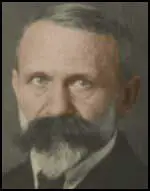Julian Marchlewski

Julian Marchlewski was born in Włocławek on 17th May, 1866. As a young man he became involved in left-wing politics and in 1889 he co-founded the Polish Workers' Union.
In an attempt to escape the authoritarian government of Alexander III, he emigrated to Zurich where he studied law and political economy. A fellow student was Rosa Luxemburg. According to their friend, Paul Frölich: "Marchlewski has described in his memoirs(unfortunately unpublished) how the satire of the young students made life difficult for Professor Wolf. They used to hatch little plots before the seminar classes. Predetermined questions were submitted to the master in all innocence. Then when Wolf had hopelessly entangled himself, Rosa Luxemburg would get up and demonstrate his professional incompetence point by point. Apparently Julius Wolf took the malicious game with the necessary sense of humour; in an autobiographical sketch he paid great tribute to his best pupil."
In 1903 Marchlewski joined with Rosa Luxemburg and Leo Jogiches to establish the Social Democratic Party of Poland. As it was an illegal organization, he spent a great deal of time in Paris , where he helped to edit the party's newspaper, Sprawa Robotnicza (Workers' Cause). By 1905 the party had a membership of 25,000.
During the 1905 Revolution Marchlewski returned to Warsaw where he was soon arrested. On his release he moved to Russia where he became a supporter of Lenin. He later emigrated to Germany where he became a member of the Social Democratic Party (SDP).
Karl Liebknecht was the only member of the Reichstag who voted against Germany's participation in the First World War. He argued: "This war, which none of the peoples involved desired, was not started for the benefit of the German or of any other people. It is an Imperialist war, a war for capitalist domination of the world markets and for the political domination of the important countries in the interest of industrial and financial capitalism. Arising out of the armament race, it is a preventative war provoked by the German and Austrian war parties in the obscurity of semi-absolutism and of secret diplomacy."
Clara Zetkin later recalled: "The struggle was supposed to begin with a protest against the voting of war credits by the social-democratic Reichstag deputies, but it had to be conducted in such a way that it would be throttled by the cunning tricks of the military authorities and the censorship. Moreover, and above all, the significance of such a protest would doubtless be enhanced, if it was supported from the outset by a goodly number of well-known social-democratic militants."
Immediately after the vote on war credits in the Reichstag, a group of SDP anti-militarist activists, including Marchlewski, Franz Mehring, Wilhelm Pieck, Ernest Meyer, Hermann Duncker and Hugo Eberlein met at the home of Rosa Luxemburg to discuss future action. They agreed to campaign against the war but decided against forming a new party and agreed to continue working within the SPD.
Over the next few months members of this group were arrested and spent several short spells in prison. On the release of Rosa Luxemburg in February 1916, it was decided to establish an underground political organization called Spartakusbund (Spartacus League). The Spartacus League publicized its views in its illegal newspaper, Spartacus Letters. Like the Bolsheviks in Russia, they began to argue that socialists should turn this nationalist conflict into a revolutionary war.
Dick Howard has argued: "Agitation continued throughout the war; yet the Spartacus League was never very strong. All agitation had to be carried out in strict secrecy, and the leaders were more often than not in jail." Members included Rosa Luxemburg, Karl Liebknecht, Leo Jogiches, Paul Levi, Ernest Meyer, Franz Mehring, Clara Zetkin, Wilhelm Pieck, Hermann Duncker and Hugo Eberlein.
On 1st May, 1916, the Spartacus League decided to come out into the open and organized a demonstration against the First World War in the Potsdamer Platz in Berlin. One of those who attended reported: "It was a great success. At eight o'clock in the morning a dense throng of workers - almost ten thousand - assembled in the square, which the police had already occupied well ahead of time. Karl Liebknecht, in uniform, and Rosa Luxemburg were in the midst of the demonstrators and greeted with cheers from all sides." Several of its leaders, including Marchlewski , Liebknecht and Luxemburg were arrested and imprisoned.
After the Russian Revolution, the Bolshevik government arranged for Marchlewski to be exchanged for a German spy. He then became the leader of the Polish Provisional Revolutionary Committee in Białystok in 1920, which planned to declare the Polish Soviet Socialist Republic. Marchlewski later returned to Moscow where he helped with the government plans for agriculture.
Julian Marchlewski died near Nervi, during a vacation, on 22nd March, 1925.
